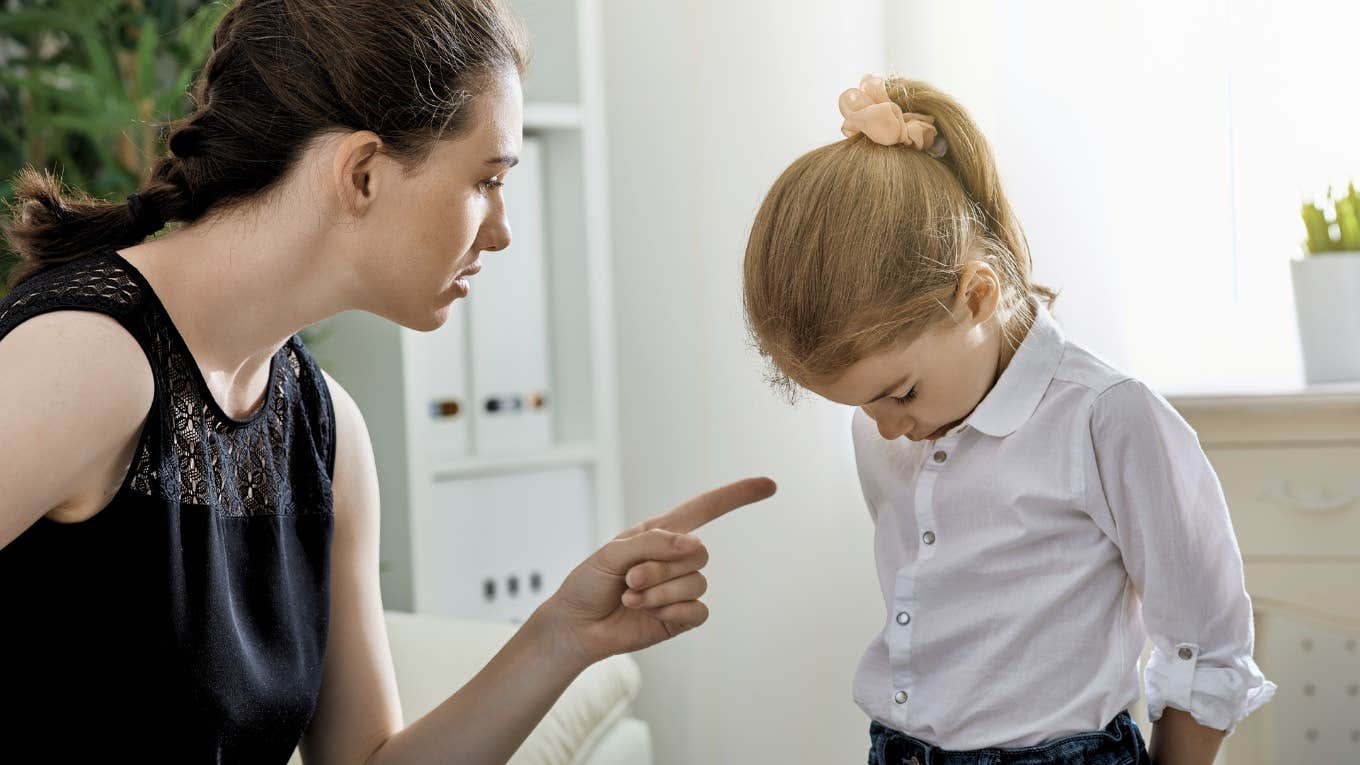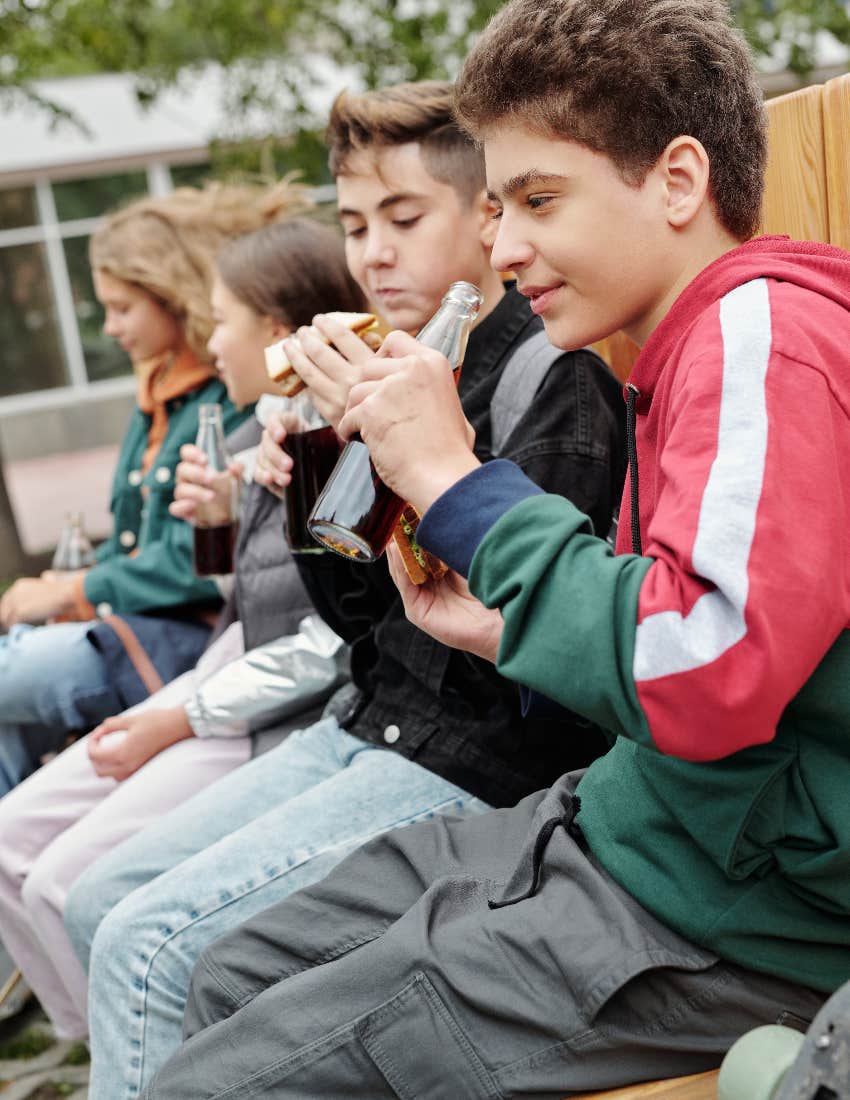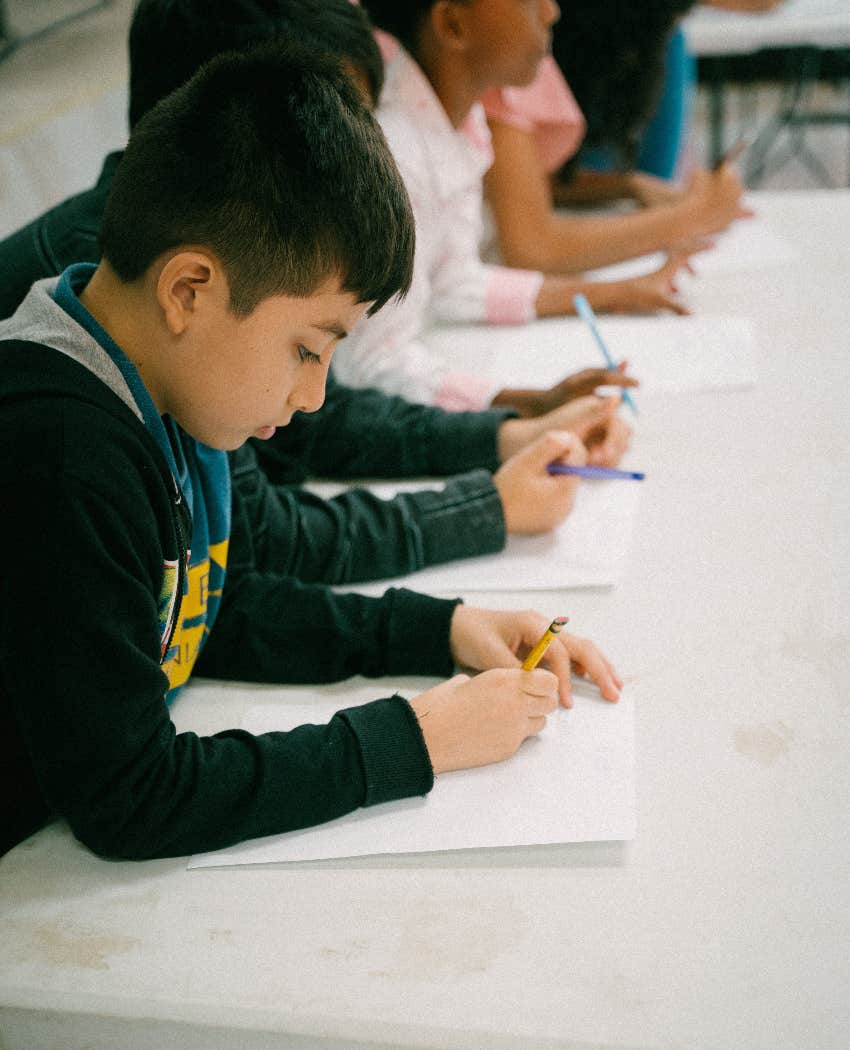
Don’t blame the helicopter parents. Blame society for creating them.
By Elizabeth Broadbent
Last updated on Jan 07, 2024
Photo: Yuganov Konstantin / Canva

Everyone decries the helicopter parent: the one who coddles their spoiled offspring, who smoothes every obstacle, who argues every grade. We use them as a convenient punching bag for the ills of society.
But helicopter parents are only the logical fruition of the invention of childhood that began with the Elizabethans, which continued into the Victorian ages.
Kids used to be seen as a kind of mini-adult. Now, we forbid them from walking down the block to the local park. We pretend that there’s a magical demarcation between childhood and adulthood — it comes somewhere between 16 and 21.
Before that, we don’t treat kids like mini-adults. We treat them as subhumans.
Here are 12 sad ways America treats kids like subhumans.
1. We deny their rights to adequate medical treatment.
Obviously, any kid would refuse vaccinations (which should be offered with pain relief, many contend), and some medical procedures are necessary for the child’s good (ear tubes, cancer treatment). But 58.9% of newborn males are circumcised: a procedure that permanently alters their appearance and sexual function.
Infants can’t offer informed consent for an operation most of the world considers unnecessary. Moreover, only 45% of these operations are performed with any kind of anesthesia. Let that sink in for a moment.
RELATED: Parents: Your Child Is A Person, Not An Accessory To Be Flaunted
We routinely lop off part of a newborn boy’s penis without so much as a Tylenol. Concludes the International Center for the Study of Pain (ICSP), “Inadequate prevention and relief of children’s pain is still widespread.”
The ICSP explains that there are “shortcomings” related to most “children’s ability to perceive, respond to, and be harmed by pain.” Don’t buy it? Think of the coach saying, “Walk it off, boy!” or the parent who admonishes their child to stop crying after a fall by saying, “Calm down. It doesn’t hurt that bad.”
We make ourselves the arbiter of children’s pain thresholds — something we’d never do to an adult. Their pain is a nuisance, an inconvenience, or simply invisible.
2. We ignore their emotional pain.
We often treat children’s emotional pain the same way we treat their physical pain — i.e., not at all. Depression in children is historically overlooked; we deny they can experience it and shame often prevents parents from seeking treatment.
While shelves of books exist to deal with cliques and bullying, parents brush off children’s sadness on a regular basis. Babies are left to scream themselves to sleep in a method called “cry-it-out,” with the mistaken idea they need to learn self-soothing. We’d never leave our spouses to weep themselves to sleep (and if we admitted it, we’d be called a monster).
We ignore a child’s sadness over a spilled ice cream cone, a missed trip to the park, or a broken toy. Their feelings are as real (and as hurtful) as an adult’s. Because children’s emotions are more volatile, we see them as less authentic.
Even otherwise good parents find it more convenient to abandon a kid to their feelings — to tell them to calm down, or shut up, or shake it off — than to comfort them.
3. We feed them subpar food.
Children’s menus are just bar food without alcohol. They get chicken fingers instead of steak, PB&J instead of salad. Junior won’t eat "real" food? Maybe it’s because you’ve fed him on pablum his whole life. Pureed “chicken and chicken gravy” or “beef and beef gravy” is not a viable human food (but we think it is!).
When they graduate from that, we give them baby puffs and yogurt balls and squeezy packages of soupy, pureed apple/banana/grape mash.
No adult would ever choose to eat this stuff, the same way they’d never down an artificially flavored, from-concentrate, corn-syrup-laden juice box. Adults don’t drink Tampico unless they’re mixing it with vodka at a frat party. They’d also never eat school lunch.
 Photo: Max Fischer / Pexels
Photo: Max Fischer / Pexels
RELATED: 20-Something Questions Why 'Resenting Your Children' Is So Common Among Gen X & Boomer Parents
4. We serve up unsubstantial comedy in the name of entertainment.
When we picture the halcyon days of childhood, we aren’t imagining staring at the TV for hours on end. But that’s what kids do; children spend an average of seven hours a day in front of a screen. And they aren’t watching "Citizen Kane." They aren’t even watching hand-drawn animation anymore.
Computer-generated ugliness is the order of the day, and once they grow a bit, they become wise-cracking, unfunny comedies with a laugh track (does anything remotely recognized as "cultured" come with a laugh track?).
Decent children’s entertainment exists in movies like "The Secret of Kells" and "The Triplets of Belleville." But kids aren’t spending seven hours watching hand-drawn European animation with a theme and an aesthetic value.
5. We use them to make money.
Child prostitution might be illegal, but child advertising certainly isn’t. Companies spend $15-17 billion a year marketing to children and before 8 years old, kids don’t understand the commercial’s persuasive intent.
Little kids can’t even distinguish between commercials and entertainment. We take advantage of their lack of understanding to make them buy things; they are regularly deceived into wanting products.
And those commercials push poor playthings. HABA Toys and Melissa and Doug don’t advertise on Nick Jr. Commercials push children into wanting cheaply-made, plastic toys usually manufactured overseas in poor working conditions.
They constrain play into pre-arranged storylines (think Batman versus the Joker) which dampens a child’s natural desire to explore and imagine. Even worse, we settle for these poorly-made toys, snatching up piles of plastic action figures each Christmas and substituting the latest Nerf accessory for true-time spent together.
RELATED: The Biggest Signs A Parent Isn't Equipped To Handle Their Child's Emotions, According To Experts
6. We deny them a lack of real responsibility.
Most charters recognize meaningful work as a fundamental human right. Obviously, kids shouldn’t be marched off to the coal mines and child labor is a serious problem in many places (including the United States).
But kids ages 6 through 12 only do an average of a half-hour of work a day.
Meaningful work leads to a sense of personal responsibility and value; it teaches children how to care for themselves and for others. It’s not glamorous or fun, but it’s a part of being in a family — and teens who do more household work report greater levels of happiness.
7. We warehouse them in insufficient educational institutions.
Obviously, we can’t just do away with daycares and schools. But we can make them better.
Daycares often hit the news for child abuse and squalid conditions; they’ve been shown to cause a rise in cortisol, particularly in preschoolers and children with difficult temperaments. Daycare staff are often undereducated and face a high turnover rate. All of this leads to an increase in child stress.
American schools suffer from an overemphasis on standardized testing. Remember the stress of those? Grueling procedures in which children sit still and pencil in bubbles for hours on end?
Schools often have unmanageable class sizes (30 children is the norm in many places) and inadequate books, paper, and other necessary supplies. And these are the good schools, the ones without crumbling buildings and exhausted staff.
 Photo: Kairos Panamá / Pexels
Photo: Kairos Panamá / Pexels
8. We allow corporal punishment.
In America, the rule of thumb tends to be that it’s legal as long as it doesn’t leave a mark. We regularly use physical punishment like “spanking” or “whooping” or “tapping” or “slapping” children for any number of infractions from ages as young as six months.
In adults, we call this “assault and battery.” In children, we call this “discipline.” And despite the numerous studies proving it’s harmful, we keep it up in an effort to promote compliance and obedience.
9. We deny them basic knowledge about themselves and the world.
Generally, due to the high volume of sales, all textbooks must pass the Texas State Board of Education.
Books that mention the theory of evolution are generally denied approval as are those who mention labor unions in a positive light. Sexual education varies by state but many children leave school without basic knowledge of the human menstrual cycle.
Additionally, the Board has rejected textbooks that provide information on climate change, portray fossil fuels and oil in a "negative" light, and even control the types of books that appear in libraries.
RELATED: 5 Key Life Lessons Parents & Kids Can Learn Together
Related Stories From YourTango:
10. We deny them reasonable freedom of movement.
In 2015, two Maryland parents were investigated by the Department of Social Services for letting their 6- and 10-year-old children walk to neighboring playgrounds. They were found guilty of unsubstantiated child abuse.
Leonore Skenazy, the doyenne of the blog Free Range Kids, received the opprobrium of a nation and was labeled the "Worst Mom in America" when she allowed her 9-year-old son to negotiate the New York City subway system on his own.
11. We deny children the right to move around unsupervised.
Many parents even hesitate to leave their kids alone in their own backyards. This fosters dependence and denies children the right to learn to understand the world without the presence of an ever-hovering adult.
It also encourages them to believe the world around them is a dangerous place from which they need constant protection.
12. We don’t see kids as people.
We see kids as less than people, as beings sometimes denied rights afforded to animals. We may remember childhood as magical. But those memories include a lot of convenient elisions, forgetting, and brainwashing (see: nostalgia for Teenage Mutant Ninja Turtles).
Children deserve better. They deserve to be recognized as full humans and allowed, as much as developmentally possible, to have a full and interesting life with quality choices in food, entertainment and play, and with as much freedom as possible to become humane, sane, and educated adults.
Don’t blame the helicopter parents. Blame society for creating them.
More for You:
Elizabeth Broadbent is a writer, journalist, and speculative fiction author. Her work has been featured on Huffington Post, Scary Mommy, Babble, The Washington Post, Insider, CafeMom, Romper, and Ravishly, among many others, where she writes about parenting, mental health, and lifestyle topics.
